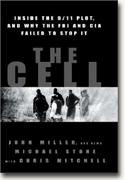The Cell
John Miller & Michael Stone
book reviews:
· general fiction
· chick lit/romance
· sci-fi/fantasy
· graphic novels
· nonfiction
· audio books
· author interviews
· children's books @
curledupkids.com
· DVD reviews @
curledupdvd.com
newsletter
win books
buy online
links
home
for authors
& publishers
for reviewers

 |
The Cell: Inside the 9/11 Plot, And Why the FBI and CIA Failed to Stop It John Miller & Michael Stone Hyperion Hardcover 336 pages August 2002 |
|
The first problem with The Cell, John Miller and Michael Stone’s account of Islamist terrorism and American attempts to intercede before 9/11, is the subtitle, which contains an assumption about law enforcement and intelligence that is anti-liberal (in the sense of a government of limited scope) and assured only in retrospect. The book is also burdened with John Miller’s egotistic first-person intrusions into the third-person narrative of this police procedural, which add little except for Miller’s meeting with Osama bin Laden. There is also no index or organizational chart to add clarity to the sometimes overwhelming accretion of names and detail. Despite these flaws, The Cell provides the legwork, the connections and the specifics to understand the scope of the problem of Islamist terror networks and the difficulties law enforcement faces in trying to stop it.
Miller and Stone wrote The Cell in the laconic, street-wise style of tabloid crime reporters, dividing the world into “The Good Guys,” hard-working detectives and FBI and CIA agents protecting you and me, and everyone else: those who stand in the way of the good guys—judges, diplomats, bureaucrats—and the terrorists. The narrative is stripped of any external structure to just the facts. Only at the end do we get any “lessons” or attempts to put this into any kind of larger framework. It suits the subject, sort of. This is a story with the tragic inevitability of noir and the global reach of a (post) Cold War thriller. It is also mirrors the authors’ conclusion that “it requires old-fashioned investigative shoe leather, human intelligence, and face-to-face encounters at every level of government” to fight terrorism effectively. This matter-of-fact style, though, masks a fundamental flaw: much street-level human intelligence is either unreliable or the very human agent cannot draw effective conclusions from it. In an age when terrorism is no longer “propaganda by deed,” when a terrorist cell can be a virtually impossible to trace one or two people and still create havoc, we cannot kid ourselves that the Good Guys are going to stop every terrorist plot, especially if we still want freedom of movement, international trade and right not to have our neighbors or the state spy on us. When we lose those rights, then the terrorists have won.
|
|
|
|
 Click here to learn more about this month's sponsor! |
|
| fiction · sf/f · comic books · nonfiction · audio newsletter · free book contest · buy books online review index · links · · authors & publishers reviewers |
|
| site by ELBO Computing Resources, Inc. | |
 The authors begin their story with the assassination of Meir Kahane in 1990 by an Islamist militant. The “first cell” that perpetrated this assassination leads through tangents and turns to the first World Trade Center bombing. Miller and Stone detail the efforts of detectives and agents foiled mid-investigation by infighting, turf-warfare, bureaucratic stagnation and shifting public priorities. The story moves to the bold attempts by the terrorist Ramzi Yousef to destroy multiple airliners simultaneously in the air, Yousef’s successful—if lucky—apprehension, the Kenyan Embassy bombings and bombing of the USS Cole, and finally fascinating portraits of the 9/11 hijackers, including Miller’s tragicomic encounter with bin Laden in person. The Cell collects every failure to act on human intelligence, including warnings about the Embassy bombings, and every missed opportunity (the Clinton administration could have take bin Laden into custody with Sudanese help but elected not to as there was not sufficient evidence). The lapses are often damning, though the authors should be more careful to recognize how tenuous many of these lost opportunities really were.
The authors begin their story with the assassination of Meir Kahane in 1990 by an Islamist militant. The “first cell” that perpetrated this assassination leads through tangents and turns to the first World Trade Center bombing. Miller and Stone detail the efforts of detectives and agents foiled mid-investigation by infighting, turf-warfare, bureaucratic stagnation and shifting public priorities. The story moves to the bold attempts by the terrorist Ramzi Yousef to destroy multiple airliners simultaneously in the air, Yousef’s successful—if lucky—apprehension, the Kenyan Embassy bombings and bombing of the USS Cole, and finally fascinating portraits of the 9/11 hijackers, including Miller’s tragicomic encounter with bin Laden in person. The Cell collects every failure to act on human intelligence, including warnings about the Embassy bombings, and every missed opportunity (the Clinton administration could have take bin Laden into custody with Sudanese help but elected not to as there was not sufficient evidence). The lapses are often damning, though the authors should be more careful to recognize how tenuous many of these lost opportunities really were.